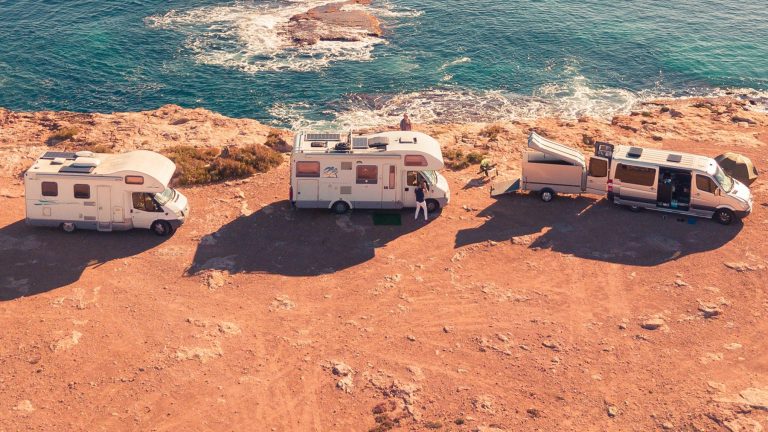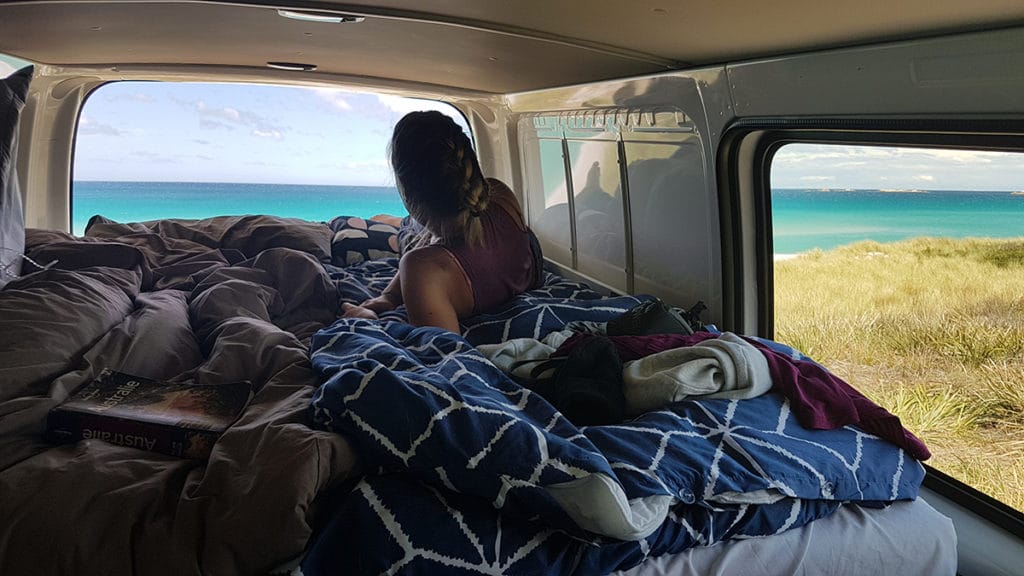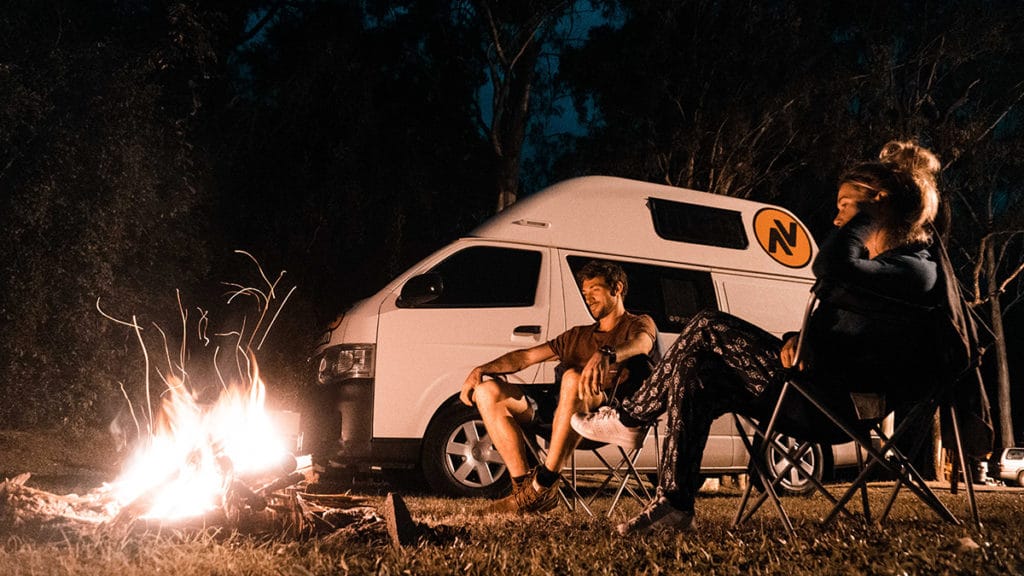
If you decide to rent a Motorhome, Campervan, or any other type of vehicle in Australia, one of the most important things to consider is insurance! Accidents happen to the best of us. Finding the right motorhome insurance can be quite confusing. A ‘comprehensive’ insurance is obviously ideal but can be taxing to your budget. In this article, we share some tips and background information on different vehicle insurance options, with a special focus on what they do and don’t cover.
Table of Contents
How to find cheap Campervan & Motorhome deals in Australia & NZ?
Renting a van in Australia allows you to explore this vast country in a flexible and economical way. Van rental agencies are present in major Australian cities, airports, and tourist areas, offering a variety of options.
To find the vehicle that best suits your needs and budget, use an online comparison tool like Motorhome Republic. This will enable you to compare the vehicles available for your travel dates, rates, and options:
Vehicle Rental Conditions in Australia To rent a van in Australia, you must:
- be at least 18 years old (the minimum age may vary by agency)
- have a valid driving license (plus an international licence or a NAATI translation of your national license if not in English).
- have a credit card (which will be used for payment and also as a deposit when picking up the vehicle).
The ‘Standard’ Insurance
Standard insurance is mandatory third-party insurance. It is automatically included when renting a vehicle. If you are responsible for an accident, this insurance will cover injuries afflicted to other persons but, it will not cover any vehicle damage. This means that the repairs of the damaged vehicle(s) will be your responsibility.
How does it work?
When making your booking, you can choose not to take the insurance options offered by the rental company. In this case, you will only pay for the hire of the vehicle. However, the rental agency will require you to leave a bond. This deposit will most likely be debited from your bank account (via credit card) and will be credited back to you at the end of your trip, providing that it passes the return inspection. The amount of the deposit will vary depending on the rental agency and type of vehicle.
Examples
Deposit for a campervan: Between $3000 to $4000
Deposit for a Motorhome: Between $5000 to $7500.
In case of accident
Option 1: You are in an accident but are not held responsible
If the rental motorhome is damaged, the insurance of the driver responsible for the accident will have to cover the cost of the repairs, provided a police report is made. In the event of an accident, remember to take photos of the scene, the contact details of the other driver, the registration of the vehicle, etc. A blank report is in the vehicle.
Option 2: You have an accident and you are held responsible
You will have to pay the repair costs for the rental vehicle up to the amount of the deposit. If, for example, the damages amount up to 1000 AUD and your deposit was 2500 AUD you will get 1500 AUD back. If the damage amounts to 5000 AUD you will have to pay the 2500 AUD difference.
Good to know 💡
Your insurance usually covers one accident, meaning the deposit work by accident. So if you have a serious accident and the amount of damage is slightly less than, equal to or greater than the amount of the deposit, the insurer will ask for a second deposit. An insurance company always seeks to cover itself in case of a second accident.
Example: You rent a vehicle for 3 weeks. The bond is $5,000. You have an accident on the second day of your trip and the damage amounts to $3,000. The supplier will ask you to add $2000 to cover possible future accidents during the rental.
Warning ⚠️
Depending on the general conditions of the motorhome rental agency, you might be held completely responsible for the entire amount of damages if there is no external cause for the accident. If the amount of damage is greater than your deposit, the insurance will not cover the difference and you will have to pay the full amount. For example, if you roll the vehicle without any other vehicle being involved, you are held liable for all damages and will be required to pay the full cost of repairs.
Pros and Cons of Standard Insurance
Advantage
Disadvantage
- You have to leave a large deposit
- In the event of a serious accident, you can lose all the deposit you paid.

The ‘Intermediate’ insurance
Most rental companies offer intermediate solutions by paying around 20 AUD a day (on top of the renting price). These insurances cover some material damage. However, before choosing any of the intermediate options find out exactly what each options cover.
How does it work?
For example, by paying 20 AUD a day you can reduce your deposit to 1500 AUD. This means that you will pay a little more for your rental, but in the event of an accident you will have to pay a maximum of 1500 AUD for the damage done to the motorhome. This is different to the standard insurance where you would have been liable for the full amount of the deposit (2500 AUD).
Pros and Cons of Intermediate Insurance
Advantage
- Reduction of the deposit. Risk is slightly lower
Disadvantage
-
In the event of an accident, you will still have to pay a fairly large sum. You still need to leave a substantial deposit.
We do not recommend this type of intermediate insurance. We consider it better to not take it if you do not have enough money to take out full insurance and take the risk. Rather than paying a little more for little security and guarantees.
The ‘Full cover’ insurance
Full cover insurance is commonly known as Comprehensive Insurance. Comprehensive insurance is the highest level of insurance which covers damages/repairs to your own vehicle as well as others.
How does it work?
Rental agencies offer comprehensive insurance packages which are sometimes referred to as ‘fully covered’ in an accident. It is therefore the safest, but also the most expensive option. By paying for this you won’t need to leave a deposit at the rental agency.
However, take into account that the insurance never covers everything! So it is extremely important to carefully read the terms and conditions of the rental agreement to ensure you understand what is covered and what is not. In many cases these so called ‘completely / fully covered’ insurance policies may not cover:
- windscreens;
- tyres;
- single vehicle rollover;
- a submerged vehicle;
- night driving;
- if you collide with an animal;
- commit an offence;
- your personal belongings; etc.
Pros and Cons of full cover insurance
Advantage
Disadvantage
Private (or ‘third party’) insurance
There are many private insurance companies that offer insurance policies. Private insurance is generally much cheaper than the full insurance offered by rental companies and has better coverage. It is the obvious choice. Make sure to thoroughly read over the Terms and Conditions of the insurance policy to understand what it does and does not cover.
How does it work?
By opting for private insurance you will choose the amount you want covered. For example, if you rent a classic van with a 2500 AUD deposit, you will choose a plan that covers 2500 AUD (or the one as close to this amount as possible). As you are not buying the insurance of the rental company, they will require you to leave a deposit. If you have an accident, the damage will be taken from your deposit and you can claim this amount from the private insurance company.
There are many private insurances, you will find them quite easily on the internet. We recommend you to use RentalCover for your private insurance. Established in 2014, RentalCover have become the go-to experts in car rental protection. Their rates are competitively priced, offering savings of up to 50% compared to the rates you would find at the rental desk.
You can use private insurance both when renting a car or a campervan / Motorhome.
Pros and Cons of private insurance
Advantage
Disadvantage

The Insurance via your Credit Card
Some banks offer insurance for vehicle rentals. This is often the case with Visa Premier or Mastercard Gold cards.
How does it work?
Provided you have a Visa Premier or Mastercard Gold card, we recommend you check with them if you are covered for an accident with a Campervan or Motorhome. Often vehicles are covered up to a certain size (depending on cubic meters), so you could be covered for car rental but not necessarily for a van or motorhome. If you are covered, it means you will still be required to leave a deposit at the rental company. In case of an accident, the rental company will use the deposit to make repairs and you will be able to claim a refund with your bank.
Pros and Cons of Credit Card insurance
Advantage
Disadvantage

How to find the right cover for your rental?
Navigating the myriad of insurance options can be a complex task, especially when trying to compare rental insurance from abroad online. It requires the ability to differentiate between comprehensive providers and private insurance offers on web portals. Even if you succeed in this, finding a comparative tool, similar to those available for health insurance, to assess the differences in coverage between various insurances, is not straightforward. Here are some guidelines to assist you in your search.
A common approach to renting a motorhome internationally is to use a rental company comparison website. These sites are particularly helpful for foreigners unfamiliar with local rental companies, making it challenging to know where to start looking. These websites offer a comprehensive view of the local car rental market, including current pricing. While these platforms are user-friendly and efficient, it’s advisable to make an informed decision after understanding the various practices in the industry.
When you attempt to book a vehicle through these sites, you may encounter different scenarios depending on your selection. Upon choosing an offer:
Situation No. 1: The website will only offer you rental deals with insurance via the rental company.
There might only be one proposal or several ‘package’ proposals. In this case the package deals are not ‘all inclusive’, but rather intermediate insurance.
Situation No. 2: The website offers you private insurance.
How do you recognise it? The website will specify that it is not a product of its own and that it not a product offered by the rental company (i.e. a ‘third’ party). Instead it will mention ‘Provided by X’ accompanied by the logo of the insurance company or ‘this coverage of independent insurance is offered to you by X’.
How do you recognise the different types of insurance?
The comparator must specify that it is not its own product, nor is it a product offered by the vehicle supplier. You may then see the words “Supplied by XX” accompanied by the insurance company’s logo, or “This independent excess cover is offered to you by XX”.
Situation No. 3: The website offers you both types of insurance.
The comparator offers you both types of insurance. You then have the option of choosing your insurance. However, be careful, as comparators can sometimes give the impression that comprehensive private insurance is supplementary insurance, to be taken out in addition to the provider’s insurance. For example, when it is labelled “Protection Plus” or “excess cover option”… But private insurance stands on its own.
What’s in it for you to take out both types of insurance? Obviously, this is not the most economical choice – quite the contrary. However, if you want to be as well covered as possible but can’t afford to be debited for the deposit, taking out both policies may be an option.
While comparison websites offer all types of insurance do not feel compelled to buy it of them. You can book a motorhome via the comparative website, select that you do not wish to purchase insurance, and then buy the insurance elsewhere. This is often a good choice to save money.
Van rental insurance companies
In Australia, there aren’t really any insurers specialising in van/campervan hire. Among vehicle insurers, there are a few that offer cover for this type of vehicle. These include RentalCover, TripCover and Car Hire Excess Insurance. It’s easy to get a quote online. All you need to do is enter your rental dates, nationality and location (state). Then remember to adjust the amount of cover, as the default is around AUD 4,000. However, for some vehicles (such as motorhomes) you will need to increase the cover to AUD 7000 or 8000.
In terms of rates, you should expect to pay around $20 per rental day (for a 2-week rental with AUD 5,000 cover).
Now that you know everything there is to know about rental insurance, you can compare van and motorhome rental prices!
FAQs
Yes, short-term insurance is available, especially through rental companies for travelers who are renting a motorhome for a holiday.
In the event of an accident or damage, contact your rental company immediately. The process typically involves providing details of the incident, any third-party involvement, and police reports if applicable. Remember to take photos of the accident and details or the other driver (if applicable).
Insurance provided by the rental company does not cover your belongings in the vehicle. You need to have your own cover for your belongings during your travel in Australia or New Zealand or anywhere else!
In general, policies include roadside assistance and breakdown cover. It’s important to check this with your rental company when making your booking.


























